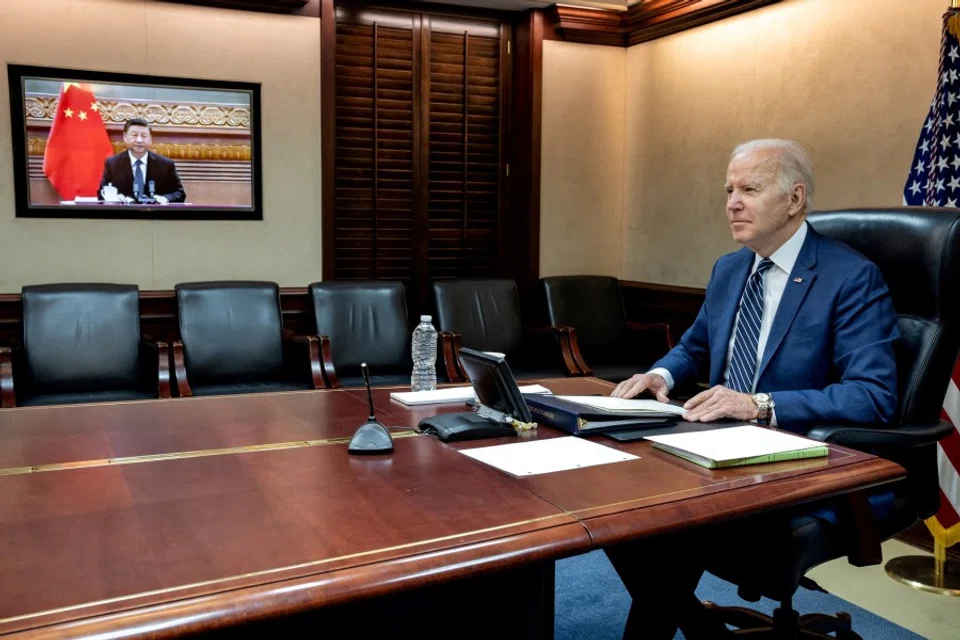Xi Jinping's answer to Washington's expansionist moves in Asia and the world
Chinese President Xi Jinping has suggested a "balanced, effective and sustainable security architecture" to manage the fallout of Russia's invasion of Ukraine and to ensure stability regionally and worldwide. He seems to suggest that the balance of national interests, not balance of power, is better at promoting a regional order for Asia or East Asia too.

US President Joe Biden spoke to his Chinese counterpart Xi Jinping on 18 March 2022 about "consequences if China provides material support to Russia" in its ongoing war against Ukraine. Xi emphasised, on his part, the need for "major countries to respect each other". In his view, the best formula for an "enduring solution" is to "build step by step a balanced, effective and sustainable security architecture for the region and for the world".
By asking major countries to "refrain from bloc confrontation", Xi showed disfavour for the balance-of-power approach to an "enduring solution". He also urged Biden to help "ease the security concerns [a key national interest] of both Russia and Ukraine". Together, these two aspects of an "enduring solution" reflect Xi's advocacy of the viable balancing of relevant national interests.
Like Russia, China is wary of Washington's expansionist moves into areas that directly affect Beijing's strategic interests - Asia.
Credibility of Xi's proposal
In emphasising the building of peace "step by step" in Europe and in the world, President Xi has also signalled the need for an Asian security architecture. Like Russia, China is wary of Washington's expansionist moves into areas that directly affect Beijing's strategic interests - Asia. Much like Russia, China is concerned about the "expansion" of the US-led North Atlantic Treaty Organisation (NATO) in Europe.
Furthermore, by not endorsing Russian President Vladimir Putin's war, despite China and Russia being each other's "strategic anchor", Xi has sought to enhance his credibility as an equidistant leader more inclined towards world peace than global dominance. Chinese Foreign Minister Wang Yi, too, had told the international media in Beijing on 7 March 2022 that his country was adopting an "objective and impartial attitude" towards the invasion.

This was evident even earlier when China abstained from voting on the US-sponsored resolution against Russia in the United Nations Security Council (UNSC) on 25 February.
Putin's objective was to "demilitarise...Ukraine". In a veiled rebuttal, Chinese ambassador Zhang Jun told UNSC that the security of one state could not come at the expense of another state. Supporting Russia, he also said that "Ukraine should become a bridge between East and West, not an outpost" of NATO.
By "strengthening" the Five Eyes, "peddling" the Quad, "piecing together" AUKUS, and "tightening" bilateral military alliances, Washington was already creating a "sinister" "five-four-three-two formation", Foreign Minister Wang Yi argued.
China's fear of an emerging '5-4-3-2' Indo-Pacific NATO
To be sure, China has begun to sense multiple US strategies to contain it through the "disruptive" process of creating a NATO-like entity in Asia. America's "real goal" was to "establish an Indo-Pacific version of NATO", Wang said on 7 March.
By "strengthening" the Five Eyes, "peddling" the Quad, "piecing together" AUKUS, and "tightening" bilateral military alliances, Washington was already creating a "sinister" "five-four-three-two formation", Wang argued.
Beijing monitors both the multipurpose Quad (comprising the US, Japan, India, Australia) and AUKUS, a military network among the US, the UK and Australia. "Five Eyes" is a grouping of the US, the UK, Canada, Australia, New Zealand; they monitor China in the new science and technology domains.

What makes China suspicious of the US? During the Obama presidency, President Xi explored the prospect of forming a US-China Group of Two (G2) at the apex of global governance. But, despite China's rapid rise during 2009-2016 and America's slowing dynamism as a superpower, Obama was not responsive. There is no US-China G2 at the UN or elsewhere today.
Instead, China recognises that "the world is becoming a multipolar one" today. It is clear, therefore, that Asia too will need a balanced and effective security architecture to manage multiple national aspirations, as in Xi's advocacy for Europe and the world.
Balance of interests, not balance of power
Balancing national interests will be more challenging than measuring the balance of power which is largely sustained by military inventories and technology capabilities. However, multilateral diplomacy, at its baseline, is driven by national interest as perceived by each protagonist. Any "security architecture" for Asia can, therefore, be negotiated on the basis of national interests.
As the aspiring pivotal Asian power, China may have to take the lead in striving for the creation of a balanced, effective, and sustainable security mechanism for Asia. The downside is that China itself is seen as an expansionist power, especially in the South China Sea.
The strategic situation in Asia is, therefore, complex. NATO is a living military alliance with an arguable "expansionist" appetite in Europe. In contrast, the "Indo-Pacific version of NATO" is only a potential entity which, however, dominates Beijing's worldview today.
Japan, India, and South Korea - potential members of an "Indo-Pacific version of NATO" - matter to China in its vision of a multipolar Asia too. However, Beijing sees them as being wary of China and friendly towards the US.
This scenario may resemble a bipolar world divided between a US-led Indo-Pacific formation and China (with or without allies or partners like Russia and Pakistan).

Not a potential paper tiger
Should a US-led military alliance (with or without India) emerge, say, as an Indo-Pacific treaty organisation, it will not be a paper tiger. But the balance of interests can still be the best basis for pragmatic interactions between China and this new entity (if it emerges).
This scenario may resemble a bipolar world divided between a US-led Indo-Pacific formation and China (with or without allies or partners like Russia and Pakistan). However, Beijing appears willing to settle for a multipolar Asian order today (as in Wang's exposition) in the absence of a collaborative US-China G2.
Notions of either Washington or Beijing triumphing over the other are also difficult to imagine. "The need for common-sense guardrails" has been emphasised by Biden for US competition with China. But, by portraying Beijing's security concerns in stark US-centric terminology, Wang is taking the debate beyond Washington's "common sense".
The ASEAN-initiated East Asia Summit (EAS) is probably a suitable forum to brainstorm the feasibility of a "balanced security architecture" for Asia or at least East Asia. Whether China or some other stakeholder takes the lead in such a quest, it will be compatible with Xi's proposal for regional and global security models.
This essay first appeared in RSIS Commentary, a publication of the S. Rajaratnam School of International Studies (RSIS), Nanyang Technological University (NTU), Singapore as "Invasion of Ukraine - Xi's 'Balance of Interest Solution': Pre-empting an Asian NATO?" by P. S. Suryanarayana.
Related: Must China choose sides in the Russia-Ukraine war? | Russia-Ukraine war: Implications for China and the Indo-Pacific | Claim of US bioweapons operation in Ukraine pushes China closer towards Russia | China's tricky position on the Russia-Ukraine war | Elephants in the room: Why China's Two Sessions are a tad dull this year





![[Photos] Fact versus fiction: The portrayal of WWII anti-Japanese martyrs in Taiwan](https://cassette.sphdigital.com.sg/image/thinkchina/3494f8bd481870f7c65b881fd21a3fd733f573f23232376e39c532a2c7593cbc)